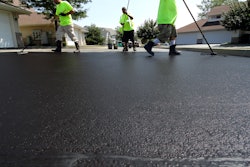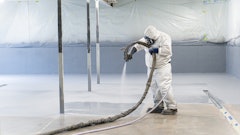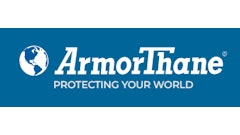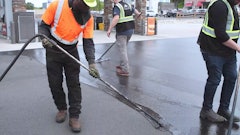Pavement sealers have been used successfully for over 60 years. Recently, environmental activists have claimed that pavement sealers are only used for cosmetic reasons, but this trivializes the important role that sealers play in pavement maintenance. The benefits of sealers are best illustrated through examining the life cycle of asphalt pavement and the important role that asphalt-based sealers and refined tar-based sealers play in pavement protection programs.
Any asset requires maintenance in order to maintain its value and to extend the useful life of the asset. An asphalt pavement driveway adds value to any home. An asphalt pavement parking lot adds value to a commercial lot. In the case of an airport, the asphalt pavement runway is an essential asset.
Asphalt hardening (the binder in the pavement) is an oxidation process and is a function of exposure to air on the surface and within the pavement. If circulation of air through the interconnected void spaces in the pavement can be prevented or reduced, the rate of hardening of the asphalt will be slowed and the life of the pavement extended. Pavement sealers are used to do just that - close the surface pores to lengthen the life of the pavement.
Use of pavement sealers is one tool in maintaining asphalt pavements. Sealers protect, preserve and make minor rehabilitation and routine maintenance easier. Pavement sealers are applied to protect the surface of hot mix asphalt (HMA) pavement from the corrosive effects of gasoline, diesel oil, motor oil, and grease that drip or are spilled onto an asphalt-based surfaces. Sealers also prolong the life of asphalt-based pavements by decreasing oxidation (that occurs via exposure to air) and ultraviolet light bleaching (that occurs via exposure to sunlight) as well as preventing moisture from entering the pavement. The net effect is an extension of the performance life of new or existing asphalt-based pavement.
The two basic types of sealers are (1) refined tar-based sealer (2) asphalt-based sealer. Both are emulsions which mean they are formulated to be applied as water-based liquid. Aggregates added to the emulsions include sand, mineral filler, or a blend of these. The addition of aggregate to the emulsion increases the density of the mixture and provides a friction component to the sealed pavement surface. The two types of emulsions are described as follows:
Refined Tar-Based Sealer
Refined tar is a byproduct of the distillation of crude coal tar. During the distillation process the lighter end oils are removed from the refined tar. Refined tar-based sealer is resistant to attack from petroleum-based products. This property makes it ideally suited for parking lots or other locations where concentrations of oil and grease leaks are common. Refined tar-based sealer is also highly resistant to ultraviolet light bleaching. It is stable, homogeneous, easy to apply, and has been handled safely by professionals and do-it-yourselfers for decades. Refined tar-based sealer has traditionally been used at gas stations, truck and bus terminals, airport aprons and taxiways as well as on residential driveways and commercial parking lots.
Asphalt-based emulsions
Asphalt-based emulsions have many of the same beneficial properties as refined tar-based emulsions, but they are less resistant to corrosion by petroleum-based products, ultraviolet bleaching and salts. An asphalt emulsion is a mixture of liquid asphalt and water. Manufacturers add special chemicals and pigments to the asphalt emulsions to improve performance but they remain susceptible to the damage caused by petroleum products.
For more about the benefits of pavement sealers in preventative maintenance programs visit the Pavement Coatings Technology Council website at www.pavementcouncil.org.



















